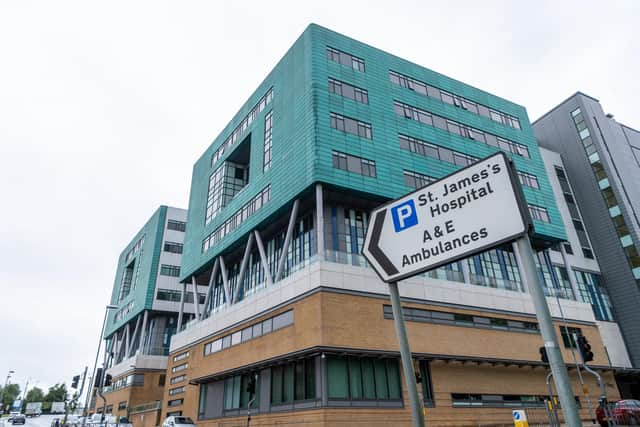Nightingale hub to be set up on site of St James' Hospital in Leeds ready for surge in Covid cases
and live on Freeview channel 276
The city’s site will be one of eight hubs set up across England, each with a capacity of around 100 patients, with work to begin as early as this week, according to NHS England.
Further sites could also be identified to add a further 4,000 “super surge” beds.
Advertisement
Hide AdAdvertisement
Hide AdThe move comes as hospitals are using hotels, hospices and care homes to safely discharge as many people who are medically fit to leave as possible – freeing up beds for those who need them most.


NHS national medical director Professor Stephen Powis said: “Given the high level of Covid-19 infections and increasing hospital admissions, the NHS is now on a war footing.
“We do not yet know exactly how many of those who catch the virus will need hospital treatment, but given the number of infections we cannot wait to find out before we act and so work is beginning from today to ensure these facilities are in place.
“We hoped never to have to use the original Nightingales and I hope we never to have to use these new hubs.”
Advertisement
Hide AdAdvertisement
Hide AdThe new Nightingale facilities – manned by a mix of hospital consultants, nurses, and other clinical and non-clinical staff – are designed to take patients who, although not fit for discharge, need minimal support and monitoring while they recover from illness.
However doctors’ union, the BMA, has called for clarity over how health chiefs plan to staff the sites.
Dr Vishal Sharma, BMA consultants committee chair, said: “As with the previous Nightingale plans, there is no real clarity on where the staff will come from to work in these eight sites. Even though they are on existing hospital premises, it is not clear how many doctors and other healthcare staff will be needed.
“There are already over 100,000 staff vacancies in the NHS and we don’t simply have a bank of spare doctors waiting to take up jobs.
Advertisement
Hide AdAdvertisement
Hide Ad“To compound the problem, thousands of healthcare workers are currently infected with COVID-19 and having to isolate. “
He added: “The Government needs to be absolutely clear about how these Nightingale sites will operate, where the staff might come from and what the impact could be on other healthcare services if doctors and other healthcare professionals are to be diverted from providing non-COVID care and services.
NHS Trusts have also been tasked with identifying places, such as gyms and education centres along with other sites, which could be converted to accommodate up to 4,000 “super surge” – roughly four times the number at a typical large district hospital.
Secretary of State for Health and Social Care Sajid Javid said: “We hope the Nightingale surge hubs at hospitals will not have to be used but it is absolutely right that we prepare for all scenarios and increase capacity.”
Advertisement
Hide AdAdvertisement
Hide AdAn NHS national deal with Hospice UK will also see up to 4,800 people a day who need ongoing monitoring, but do not need to be in hospital, receive support in either in a hospice bed or through Hospice@Home teams.
The NHS is also ramping up the use of virtual wards, where patients get monitoring technology and regular check-ins with clinicians
GPs also have access to up to 250,000 pulse oximeters – devices that can read blood-oxygen levels by scanning a finger tip – so that Covid-19 positive patients can monitor their own blood oxygen levels at home ensuring only those who need to be are admitted to hospital.
Chris Hopson, chief executive of NHS Providers – the membership organisation for NHS trusts in England, said: “Building on lessons learnt from earlier in the pandemic, trusts are identifying extra capacity on existing hospital sites that could be turned into super surge capacity should it be required.
Advertisement
Hide AdAdvertisement
Hide Ad“Trust leaders hope this back up insurance policy will never be needed, as with the original Nightingales. But it must be the right ‘no regrets later’ move to make these preparations now.
“Given the other pressures on the NHS and the current level of staff absences, staffing this capacity would be a major challenge. But co-location on existing hospital sites maximises the NHS’s ability to meet that challenge.
“We also need to recognise that this will add further stretch to an already hard pressed NHS.”
